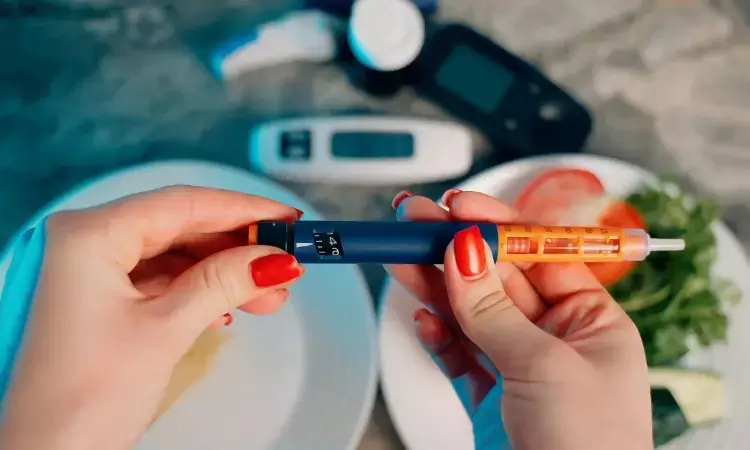- Home
- Medical news & Guidelines
- Anesthesiology
- Cardiology and CTVS
- Critical Care
- Dentistry
- Dermatology
- Diabetes and Endocrinology
- ENT
- Gastroenterology
- Medicine
- Nephrology
- Neurology
- Obstretics-Gynaecology
- Oncology
- Ophthalmology
- Orthopaedics
- Pediatrics-Neonatology
- Psychiatry
- Pulmonology
- Radiology
- Surgery
- Urology
- Laboratory Medicine
- Diet
- Nursing
- Paramedical
- Physiotherapy
- Health news
- Fact Check
- Bone Health Fact Check
- Brain Health Fact Check
- Cancer Related Fact Check
- Child Care Fact Check
- Dental and oral health fact check
- Diabetes and metabolic health fact check
- Diet and Nutrition Fact Check
- Eye and ENT Care Fact Check
- Fitness fact check
- Gut health fact check
- Heart health fact check
- Kidney health fact check
- Medical education fact check
- Men's health fact check
- Respiratory fact check
- Skin and hair care fact check
- Vaccine and Immunization fact check
- Women's health fact check
- AYUSH
- State News
- Andaman and Nicobar Islands
- Andhra Pradesh
- Arunachal Pradesh
- Assam
- Bihar
- Chandigarh
- Chattisgarh
- Dadra and Nagar Haveli
- Daman and Diu
- Delhi
- Goa
- Gujarat
- Haryana
- Himachal Pradesh
- Jammu & Kashmir
- Jharkhand
- Karnataka
- Kerala
- Ladakh
- Lakshadweep
- Madhya Pradesh
- Maharashtra
- Manipur
- Meghalaya
- Mizoram
- Nagaland
- Odisha
- Puducherry
- Punjab
- Rajasthan
- Sikkim
- Tamil Nadu
- Telangana
- Tripura
- Uttar Pradesh
- Uttrakhand
- West Bengal
- Medical Education
- Industry
Postprandial hyperinsulinemia during pregnancy may portend favourable metabolic function in years to come: Study

Canada: In a recent study published in the journal EClinicalMedicine, a group of investigators observed 306 pregnant women in the third trimester to investigate the long-term cardiometabolic effects of postprandial insulin hypersecretion in response to oral glucose tolerance testing over 4 years.
They found that higher corrected insulin responses at one year were associated with a lower risk of pre-diabetes or diabetes.
"A robust post–challenge insulin secretory response does not indicate adverse cardiometabolic health but, rather, portends favourable metabolic function in the years to come," Ravi Retnakaran, Leadership Sinai Centre for Diabetes, Mount Sinai Hospital, Toronto, Canada, and colleagues reported.
Fasting hyperinsulinemia is commonly recognised as a marker of insulin resistance. By contrast, there has been less clarity on the interpretation of postprandial hyperinsulinemia and has been the subject of recent debate. Postprandial insulin secretion is a physiologic response that is essential for the maintenance of glucose homeostasis. However, there has been no clarity on the cardiometabolic implications of postprandial hyperinsulinemia with recent studies suggesting both adverse and beneficial associations.
Dr Retnakaran and colleagues, therefore, aimed to evaluate the longitudinal cardiometabolic implications of the post–challenge insulin secretory response over 4-years follow-up in a prospective cohort study conducted in Toronto (Ontario, Canada).
For this purpose, the researchers recruited a diverse group of pregnant women with a broad glucose tolerance spectrum for cardiometabolic testing spanning several years postpartum. The participants underwent testing late in their second trimester.
Participants underwent oral glucose tolerance tests (OGTT) at 1 year, 3 years, and 5 years postpartum, enabling serial assessment of insulin sensitivity or resistance (Matsuda index, HOMA-IR), glucose tolerance, cardiovascular risk factors, and beta-cell function—via Insulin Secretion-Sensitivity Index-2 (ISSI-2) and insulinogenic index/HOMA-IR (IGI/HOMA-IR).
Baseline post–challenge insulinemia was evaluated with the corrected insulin response (CIR) at 1-year. A comparison was made between cardiometabolic factors between baseline CIR tertiles.
The study led to the following findings:
· 306 women were enrolled between Oct 23, 2003 and March 31, 2014. In this study population, there was a progressive worsening of waist circumference, HDL, insulin sensitivity, and CRP from the lowest to middle to highest tertile of CIR at 1-year. However, these adverse features were accompanied by progressively better beta-cell function, coupled with lower fasting and 2-h glucose on the OGTT.
· On adjusted longitudinal analyses, higher CIR tertile at 1 year was independently associated with (i) higher ISSI-2 and IGI/HOMA-IR and (ii) lower fasting and 2-h glucose at both 3-years and 5-years, but was not associated with BMI, waist, lipids, CRP or insulin sensitivity/resistance.
· The highest CIR tertile at 1 year predicted a lower risk of pre-diabetes or diabetes at both 3 years (adjusted OR = 0.19) and 5 years (aOR = 0.18), relative to the lowest tertile.
Findings revealed that on unadjusted cross-sectional analyses, higher corrected insulin response has associations with both favourable and adverse cardiometabolic features. However, adjusted longitudinal analyses reveal only beneficial future implications, with higher baseline CIR independently associated with lower glycaemia and better beta-cell function at both 2 years and 4 years thereafter.
Also, higher CIR at baseline is a significant independent predictor of a lower future risk of diabetes or prediabetes.
"Thus, a robust post–challenge insulin secretory response does not indicate adverse cardiometabolic health but, rather, predicts favourable metabolic function in the years to come," the researchers concluded.
Reference:
Ravi Retnakaran, Jiajie Pu, Anthony J. Hanley,et al. Future cardiometabolic implications of insulin hypersecretion in response to oral glucose: a prospective cohort study, EClinicalMedicine, 2023, DOI- https://doi.org/10.1016/j.eclinm.2023.102363, https://www.thelancet.com/journals/eclinm/article/PIIS2589-5370(23)00540-0/fulltext
Dr Kamal Kant Kohli-MBBS, DTCD- a chest specialist with more than 30 years of practice and a flair for writing clinical articles, Dr Kamal Kant Kohli joined Medical Dialogues as a Chief Editor of Medical News. Besides writing articles, as an editor, he proofreads and verifies all the medical content published on Medical Dialogues including those coming from journals, studies,medical conferences,guidelines etc. Email: drkohli@medicaldialogues.in. Contact no. 011-43720751


